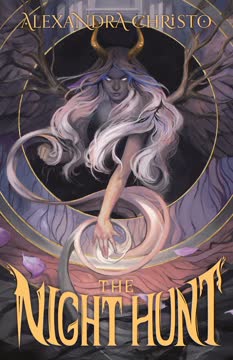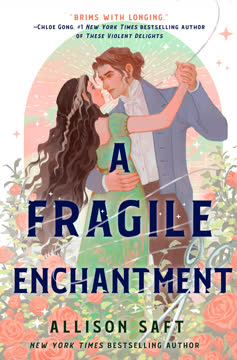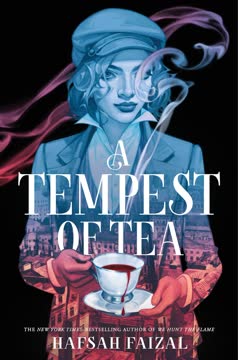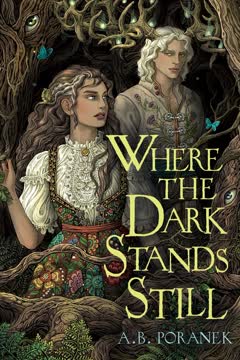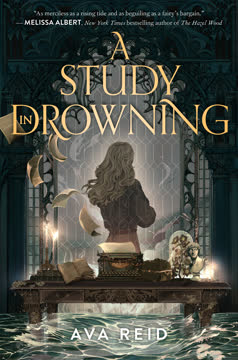Plot Summary
Monster of Mischief Awakens
In the shadows of the human world, Atia, the last Nefas, feeds on fear and chaos, her monstrous nature hidden behind a human mask. She is both predator and outcast, haunted by the loss of her family and the rules imposed by the Gods. Her only companion is Sapphir, a vampire with her own curse, and together they stalk the night, balancing hunger and the ever-present threat of divine retribution. Atia's existence is a delicate dance between survival and the longing for connection, her loneliness sharpened by the knowledge that she is the last of her kind, hunted and hated by the Gods.
Death's Messenger and the Last Nefas
Silas, a Herald of Death, ferries souls and enforces the Gods' rules. He is bound to a century of service, his memories erased, his humanity a distant ache. When he encounters Atia after a vampire's kill, he is both fascinated and wary. Their meeting is charged with mutual suspicion and a strange kinship—both are outcasts, both serve powers greater than themselves. Silas is drawn to Atia's defiance and her refusal to cower, even as he warns her of the consequences of breaking the Gods' laws. Their fates become entwined, setting the stage for a collision of destinies.
Nightmares, Allies, and Betrayal
Atia seeks solace in the human world, posing as a seer in a small village. She befriends Tristan, a scholar obsessed with monsters, and is forced to confront the dangers of attachment. When a debt collector threatens Tristan, Atia's protective instincts override her caution, leading her to kill a man with her powers. This act, though born of desperation, breaks the Gods' most sacred rule. Silas, ever the messenger, is forced to curse Atia, setting her on a path of decay and desperation. The betrayal stings, but necessity forges a new, uneasy alliance between them.
Cursed by the Gods
The curse takes hold, stripping Atia of her abilities and immortality. She is hunted not only by the Gods but by other monsters seeking the bounty on her head. Her friendship with Tristan deepens, but she is forced to keep him at arm's length, fearing for his safety. When a lykai attacks, Silas intervenes, saving Atia and revealing his own desperation. Together, they realize that only by breaking the curse—through a series of impossible killings—can Atia survive. Their partnership is cemented by necessity, but trust remains elusive.
A Bargain for Survival
Silas proposes a bargain: if Atia helps him kill a God and regain his humanity, he will help her break her curse. The path is clear but perilous—they must kill a vampire, a banshee, and a God, and drink from the River of Eternity. Joined by Tristan and later Cillian, a half-banshee, their group becomes a found family of outcasts. Each carries wounds and secrets, but together they set out on a quest that will test their loyalties, their morals, and the limits of their power.
Blood, Banshees, and Betrayal
The group seeks out Sapphir, Atia's old ally, hoping to find a vampire to kill. But Sapphir betrays them, lured by the Gods' promise of redemption. In a brutal confrontation, Atia is forced to kill Sapphir, tasting her blood and regaining a fragment of her lost power. The victory is bittersweet, tainted by the loss of a friend and the realization that betrayal is never far behind. The group presses on, their resolve hardened by necessity and the growing threat of the Gods' wrath.
The Vampire's Treachery
The group's trust is shattered as Sapphir's betrayal exposes the dangers of relying on others. Atia's sense of isolation deepens, but she is forced to rely on Silas and the others as they seek out the next target: a banshee. The journey takes them through kingdoms and into the lair of monsters, where every alliance is suspect and every victory comes at a cost. The line between friend and foe blurs, and Atia must confront the darkness within herself as much as the enemies without.
The Oracle's Price
Seeking guidance, the group visits Thia, an oracle who demands a piece of their destinies as payment. Through visions and riddles, they learn that the Queen of Alchemy, Vail, holds the last phial of the River of Eternity and is complicit in the Gods' monstrous purges. Thia warns Atia not to trust Silas, hinting at deeper betrayals. The group's path is set: they must infiltrate Vail's palace, confront the banshee, and seize the phial before the Gods can destroy them all.
The Banshee's Scream
In Vail's dungeons, the group faces a powerful banshee—Cillian's own half-sister. The confrontation is brutal, forcing Cillian to choose between vengeance and mercy. Atia kills the banshee, absorbing her power and coming closer to breaking her curse. But the phial is destroyed, and hope seems lost. The group is forced to flee, taking Vail captive and seeking new answers in the realm of the dead. The cost of power is steep, and the bonds between them are tested to the breaking point.
The Queen's Deadly Game
Vail's machinations are revealed as the group navigates her deadly palace, filled with the remains of monsters and the echoes of betrayal. The Gods' alliance with Vail exposes the depth of their corruption and the lengths they will go to maintain control. Atia and Silas's relationship deepens, but secrets threaten to tear them apart. The quest for the River of Eternity becomes a race against time, with the fate of all monsters hanging in the balance.
The Sorting Zone's Secrets
The group enters the Sorting Zone, a liminal space between life and death, seeking passage to the rivers that guard Oksenya. Guided by the enigmatic Keeper of Files, they confront the truth of their pasts and the nature of their curses. Silas's true identity begins to surface, and Atia is forced to confront the possibility that her greatest ally may also be her greatest betrayer. The journey through death is as perilous as any battle, and the cost of passage is steep.
The Keeper of Files
The Keeper reveals the tangled history of the Nefas, the Gods, and the war that shattered the realms. Atia learns that her parents were not the villains she believed, and Silas's role in her curse is exposed. The weight of betrayal threatens to destroy their alliance, but necessity forces them onward. As they descend toward the River of Death, hunted by monsters and haunted by guilt, the group must decide what they are willing to sacrifice for freedom.
The River of Death
At the River of Death, the group is attacked by Eurynomos, a monster sent by the Gods. Silas is mortally wounded, and Atia is forced to choose between saving him and regaining her own immortality. In a moment of selflessness, she saves Silas, sacrificing her chance at power. The act of mercy changes them both, forging a bond that transcends betrayal. But the path to Oksenya remains blocked, and the final confrontation with the Gods looms.
The God of Death's Offer
Thentos, the God of Death, offers Atia a final bargain: peace in exchange for abandoning her quest. The offer is a trap, designed to divide and weaken them. Atia refuses, choosing instead to face the River of Fire and the trials of Oksenya. Silas, now restored, confronts his own past and the truth of his identity. The group is fractured, but their resolve is unbroken. The final battle is at hand, and the fate of the realms hangs in the balance.
The Fire River Trial
Atia faces the River of Fire, a trial that only the worthy can survive. Drawing on the strength of her parents and her newfound sense of self, she crosses the river and enters Oksenya. The realm of the Gods is both beautiful and deadly, filled with prisons of souls and the echoes of ancient betrayals. Atia's journey is both physical and spiritual, a test of her ability to forgive, to lead, and to love.
Oksenya's Prison of Souls
In Oksenya, Atia discovers the prison of souls—the true cost of the Gods' rule. Guided by her father's petal and her mother's song, she unlocks the prison and frees the trapped monsters. The act of liberation is both a personal and cosmic victory, restoring balance to the realms and setting the stage for the final confrontation. Atia's power is restored, but the price of freedom is high.
The High Gods' Wrath
The High Gods, enraged by Atia's defiance, unleash their full power. Atia is trapped in an illusion, forced to confront her deepest fears and the ghosts of her past. With the help of her friends and the strength of her own will, she breaks free, absorbing the power of the Balance and becoming something new—a bridge between monsters and Gods. The final battle is joined, and the fate of all worlds is decided.
The God of Eternity Returns
Silas regains his memories and his divinity, revealed as Aion, the God of Eternity. Torn between loyalty to his family and his love for Atia, he chooses to stand with her against the High Gods. The battle is fierce, pitting sibling against sibling, God against God. The cost is great, but the hope of a new world drives them forward. Silas and Atia's love becomes the fulcrum on which the fate of the realms turns.
The Final War
The battle for Oksenya is brutal and transformative. The High Gods are slain, their power returned to the world. Atia, now imbued with the power of the Balance, becomes a new kind of deity—one who bridges the gap between monsters and mortals, between chaos and order. Silas, freed from his curse, chooses love over eternity. Together, they reshape the world, forging a new order from the ashes of the old.
Balance Restored
With the High Gods defeated, Atia and Silas work to restore balance to the realms. Monsters are freed, curses are lifted, and the gates between worlds are opened. The human and monster realms are united by new treaties and shared guardianship. Atia refuses the throne, choosing instead to wander and guide, to be a bridge rather than a ruler. Silas stands by her side, their love a testament to the power of choice and change.
A New World Awaits
Atia and Silas, now partners in both love and destiny, set out to explore the infinite worlds they have helped create. Tristan and Cillian find their own place in the new order, their friendship and love a beacon of hope. The realms are forever changed, but the journey is far from over. Atia and Silas leap into the unknown, ready to face whatever adventures—and monsters—await them, together.
Characters
Atia
Atia is the last of the Nefas, a race of fear-eating, illusion-weaving monsters exiled by the Gods. Orphaned and hunted, she is fiercely independent, masking her loneliness with bravado and sarcasm. Her journey is one of self-discovery, as she grapples with guilt, anger, and the longing for connection. Cursed by the Gods for breaking their rules, Atia is forced to confront her own darkness and the possibility of redemption. Her relationships—with Sapphir, Tristan, Cillian, and especially Silas—draw out her vulnerability and her capacity for love. By the end, she becomes a new kind of deity, embodying both chaos and balance, and choosing to be a bridge between worlds rather than a ruler.
Silas / Aion
Silas begins as a Herald, a messenger of Death, bound to serve the Gods and ferry souls. His memories erased, he is haunted by a sense of loss and a yearning for humanity. His relationship with Atia is fraught with suspicion, betrayal, and ultimately, profound love. As his true identity as Aion, the God of Eternity, is revealed, Silas is forced to choose between loyalty to his divine family and his newfound humanity. His arc is one of atonement and self-acceptance, culminating in his decision to stand with Atia against the High Gods and to embrace a future defined by love and change.
Sapphir
Sapphir is a centuries-old vampire, both friend and rival to Atia. Cursed to age rapidly when she kills, Sapphir is driven by hunger and desperation. Her relationship with Atia is complex—a truce born of necessity, tinged with affection and rivalry. Ultimately, Sapphir's betrayal is a catalyst for Atia's transformation, forcing her to confront the cost of trust and the inevitability of loss. Sapphir's fate is a cautionary tale about the dangers of addiction, pride, and the longing for redemption.
Tristan
Tristan is a young scholar obsessed with monsters, eager for adventure and knowledge. His innocence and optimism are a foil to Atia's cynicism, and his unwavering loyalty makes him both a liability and a source of strength. Tristan's journey is one of courage and self-discovery, as he moves from observer to participant, risking his life for his friends and finding love with Cillian. His arc is a testament to the power of curiosity, empathy, and the human capacity for growth.
Cillian
Cillian is a rare male banshee, rejected by his monstrous family and haunted by a sense of not belonging. His pain and anger are tempered by humor and resilience, and his relationship with Tristan offers him the acceptance he has always craved. Cillian's arc is one of healing and self-acceptance, as he learns to embrace both his monstrous and human sides. His role in the group is both practical and emotional, providing knowledge, power, and a reminder that family can be chosen.
Thia (Pythia)
Thia is an enigmatic oracle who feeds on destiny and delights in riddles. Her guidance is both invaluable and costly, forcing the group to confront uncomfortable truths and hidden betrayals. Thia's motivations are ambiguous—she is neither ally nor enemy, but a force of chaos and change. Her interactions with Atia and Silas are laced with warnings and provocations, pushing them toward self-realization and the breaking of cycles.
Vail, Queen of Alchemy
Vail is the ambitious and ruthless Queen of Alchemy, obsessed with collecting monsters and harnessing their power. Her alliance with the Gods makes her a formidable foe, and her betrayal is a turning point in the quest. Vail's arc is one of hubris and downfall, but also of reluctant transformation, as she is forced to accept a new role in the post-God order. Her relationship with Tristan and the group is fraught with tension, but ultimately she becomes a symbol of the possibility of change.
Thentos
Thentos is both executioner and savior, enforcing the Gods' will but also aiding Atia and Silas when it suits his sense of justice. His relationship with Silas/Aion is fraught with guilt, rivalry, and a grudging respect. Thentos embodies the ambiguity of divine power—the capacity for both mercy and cruelty. His arc is one of reluctant growth, as he learns to let go of old loyalties and embrace a new order.
The Keeper of Files
The Keeper is a mysterious, otherworldly being who guards the Library of Souls and dispenses cryptic wisdom. He is both guide and obstacle, forcing the group to confront the truth of their pasts and the nature of their curses. The Keeper's role is to maintain the balance of stories and destinies, and his interventions are always tinged with irony and ambiguity.
The High Gods (Imera, Skotadi, Isorropía)
The High Gods are the architects of the realms, embodying Day, Dark, and Balance. Their rule is absolute, their justice arbitrary, and their downfall inevitable. They are both parents and oppressors to the River Gods, and their conflict with Atia and Silas is both personal and cosmic. Their defeat marks the end of an era and the beginning of a new order, one defined by choice, connection, and the possibility of change.
Plot Devices
Dual Narration and Shifting Perspectives
The story is told in alternating chapters from Atia and Silas's perspectives, allowing readers to experience both the monstrous and the divine, the hunted and the hunter. This structure deepens the emotional resonance, highlighting the parallels and contrasts between the two protagonists. The shifting perspectives also serve to build suspense, reveal secrets, and explore the complexities of trust, betrayal, and love.
Curses, Bargains, and Loopholes
The plot is driven by a series of curses and bargains—divine rules that bind monsters and mortals alike. The quest to break Atia's curse and Silas's servitude is structured around a series of impossible tasks, each requiring sacrifice and ingenuity. The existence of loopholes and counter-magic introduces moral ambiguity and the possibility of redemption, challenging the characters to question the nature of power and the cost of freedom.
Foreshadowing and Prophecy
The presence of oracles and prophetic visions creates a sense of inevitability and tension, as characters struggle to escape or fulfill their fates. Thia's readings and the recurring motifs of names, memories, and lost destinies foreshadow key revelations and betrayals. The interplay between fate and choice is a central theme, explored through both plot and character arcs.
Found Family and Chosen Bonds
The formation of a found family—Atia, Silas, Tristan, and Cillian—serves as both a source of strength and a crucible for conflict. The bonds between them are tested by betrayal, loss, and the demands of the quest, but ultimately prove stronger than blood or destiny. The theme of chosen family is mirrored in the larger narrative, as monsters and mortals are united in the struggle for a new world.
Memory, Identity, and Transformation
The erasure and recovery of memories is a recurring motif, symbolizing the struggle for identity and the possibility of transformation. Silas's journey from Herald to God, and Atia's evolution from monster to bridge, are mirrored in the shifting nature of the realms themselves. The story explores the tension between past and future, between the desire for safety and the need for growth.
Narrative Structure and Pacing
The narrative is structured as a quest, with escalating stakes and a series of trials that test the characters' resolve and morality. Each victory is tempered by loss, and each betrayal forces a reevaluation of goals and loyalties. The pacing is relentless, driving the characters toward a final confrontation that is both epic and intimate. The resolution is both satisfying and open-ended, leaving room for new adventures and the ongoing struggle for balance.
Analysis
The Night Hunt is a dark, lush fantasy that interrogates the nature of monstrosity, divinity, and the human heart. At its core, the novel is about the search for belonging and the courage to choose connection over isolation, even when the world seems determined to break you. Through Atia and Silas, Alexandra Christo explores the trauma of exile, the seduction of power, and the redemptive potential of love. The book is unflinching in its portrayal of pain and betrayal, but it is also fiercely hopeful, insisting that even the most broken can become bridges, and that the cycle of violence can be broken by acts of mercy and self-sacrifice. The found family at the heart of the story is a testament to the power of chosen bonds, and the ending—open, adventurous, and full of possibility—reminds us that the work of healing and building a better world is never truly finished. The Night Hunt is both a thrilling adventure and a meditation on the cost and necessity of change, urging readers to embrace their own darkness and light, and to leap, together, into the unknown.
Last updated:
Review Summary
The Night Hunt received mixed reviews. Some praised its immersive world-building, engaging characters, and unique premise involving monsters and gods. Readers enjoyed the found family trope and quest-like plot. However, others found the pacing inconsistent, character development lacking, and romance underdeveloped. Many felt the book had potential but fell short in execution. The writing style and world-building were divisive, with some finding them captivating and others lacking depth. Overall, opinions varied widely, with ratings ranging from 1 to 5 stars.
